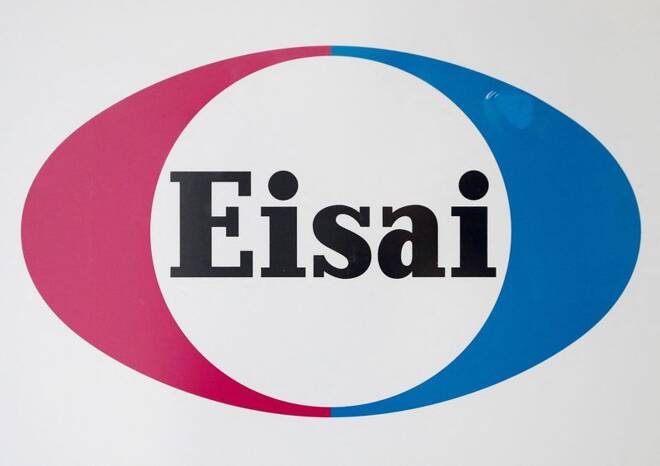Advertisement
Advertisement
Eisai, Biogen Alzheimer’s drug could be available to some next year
By:
By Deena Beasley and Julie Steenhuysen SAN FRANCISCO (Reuters) - Japan's Eisai Co plans to seek full approval of its experimental Alzheimer's drug lecanemab in the United States, Europe and Japan armed with data showing it can slow the brain-wasting disease for people with early symptoms, potentially getting the treatment to patients next year.
By Deena Beasley and Julie Steenhuysen
SAN FRANCISCO (Reuters) – Japan’s Eisai Co plans to seek full approval of its experimental Alzheimer’s drug lecanemab in the United States, Europe and Japan armed with data showing it can slow the brain-wasting disease for people with early symptoms, potentially getting the treatment to patients next year.
It remains unclear how widely the drug developed with U.S. biotech Biogen Inc will be used due to uncertainty over insurance coverage, including the U.S. government’s Medicare plan for people age 65 and over, potential side effects and cost.
One Wall Street analyst said he is not counting on measurable sales until 2024. Several estimated lecanemab may be priced at around $20,000 per year.
“Most people who this (drug) would apply to are on Medicare, and most private payers look to Medicare as they make their own (coverage) decisions. So there’s a massive roadblock in the way of all who could benefit from this treatment,” said Robert Egge, Alzheimer’s Association chief public policy officer
Eisai confirmed on Tuesday that lecanemab – an antibody designed to remove sticky deposits of a protein called amyloid beta from the brain – reduced the rate of cognitive decline on a clinical dementia scale by 27% compared to a placebo. It also gave new details on side effects including a dangerous type of brain swelling and brain bleeding.
The companies have already applied for accelerated approval with the U.S. Food and Drug Administration and expect a decision by Jan. 6. The new data will allow them to apply for full approval within days of that decision, Eisai’s U.S. CEO Ivan Cheung said in an interview.
“The medication is only for people in the very early stages of Alzheimer’s,” said Dr. Babak Tousi, a neuro-geriatrician at the Cleveland Clinic. These are people with some memory impairment but who can still engage in daily activities such as manage finances and medications, prepare meals and drive. “This is a very, very small, selective group,” he said.
Guggenheim Partners analyst Yatin Suneja said he expects the drug to get full U.S. approval in the second half of 2023, adding that Medicare would likely wait for formal approval before deciding on coverage terms.
Most U.S. Alzheimer’s patients are insured through Medicare, which will only cover patients in clinical trials for anti-amyloid drugs that have received a less stringent accelerated approval, severely limiting access to such medicines. There are no such trials ongoing, Egge said.
Michael Irizarry, Eisai’s deputy chief clinical officer, told Reuters ahead of the data release that the company has been in discussions with the agency about reconsidering its policy on Alzheimer’s drug coverage.
It is unclear how long the U.S Centers for Medicare & Medicaid Services (CMS) might take to make such a coverage determination. Irizarry said a formal process between Eisai and CMS could not begin until after the drug is approved.
CMS did not provide an immediate comment.
RBC Capital Markets analyst Brian Abrahams said he expects limited sales revenue from lecanemab in 2024.
“CMS might wait for full approval of the drug in the back half of next year before potentially broadening (its policy) and enabling coverage of lecanemab,” Abrahams said.
He estimated about 23,000 U.S. patients for the drug in the first year, rising to over 300,000 by 2031.
In a June study on lecanemab’s worth, Eisai said based on mid-stage trial data indicating the drug’s effectiveness, a price between $9,249 to $35,605 per year represented a good value. The drug is given by infusion every two weeks based on a patient’s weight.
(Reporting by Deena Beasley in San Francisco, Julie Steenhuysen in Chicago, Raghav Mahobe and Leroy Dsouza in Bangalore and Ahmed Aboulenein in Washington; writing by Caroline Humer; Editing by Bill Berkrot)
About the Author
Reuterscontributor
Reuters, the news and media division of Thomson Reuters, is the world’s largest international multimedia news provider reaching more than one billion people every day. Reuters provides trusted business, financial, national, and international news to professionals via Thomson Reuters desktops, the world's media organizations, and directly to consumers at Reuters.com and via Reuters TV. Learn more about Thomson Reuters products:
Did you find this article useful?
Latest news and analysis
Advertisement
